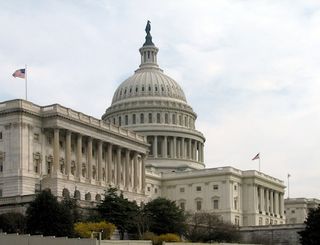Senator DeFazio: Pokémon Go Can't Trump Vehicle Deaths

Sen. Peter DeFazio (D-Ore.) has asked both FCC Chairman Tom Wheeler and Department of Transportation Secretary Anthony Foxx to "align" Administration priorities (though the FCC is an independent agency) before coming up with rules for accommodating both incumbent licensed V2V communications still in the development stage, and unlicensed Wi-Fi currently being used across the country.
The FCC is trying to free up spectrum in the 5 GHz band (5.9 GHZ specifically) for Wi-Fi, cable ops principal mobile broadband play.
DOT and the FCC are working together on testing compatibility and guarding against interference.
But in a letter to Wheeler and Foxx, DeFazio urged them to make their decision in the public interest, not commercial interest.
"The promises of DRSC [dedicated short-range communications] include fewer motor vehicle fatalities...While I understand the desire for more unlicensed Wi-Fi spectrum, the desire for better Pokémon Go play cannot be compared to the 38,000 motor vehicle deaths every year," he told Wheeler and Foxx.
DeFazio opposes a petition that would delay the rollout of V2V while cybersecurity and privacy protections are implemented. he recognizes the need for those protections, but says it will take years for the technology to penetrate the market, so there will be time to deal with those issues before "broad deployment."
Public Knowledge, which is advocating for freeing up spectrum, says it agrees on protecting cybersecurity and privacy, and that those need to be addressed ASAP, but not with the need to launch DSRC ASAP. "“We respectfully disagree with Rep. DeFazio on the need to allow DSRC to go forward before cybersecurity and privacy concerns are fully resolved," said Public Knowledge SVP Harold Feld.
Multichannel Newsletter
The smarter way to stay on top of the multichannel video marketplace. Sign up below.
On June 1, the FCC issued a public notice on the 5.9 GHz band, including setting a January 2017 deadline for completing testing of sharing in the band.
Cable operators have been pushing for more 5 GHz spectrum to fuel their Wi-Fi hotspots, the industry's primary mobile broadband play.
The FCC has an open inquiry into using the band for unlicensed, and DOT has agreed on testing the co-existence of vehicle-to-vehicle communications (intelligent transportation system [ITS] devices) and Wi-Fi.
Wheeler joined by Commerce Secretary Penny Pritzker and Transportation Secretary Anthony Foxx, in January outlined a three-phase device-testing regime to potentially open up new spectrum in the 5.9-Gigahertz band for more cable WiFi hotspots without interfering with automobile crash-avoidance systems.
Unlicensed devices will have to pass all three tests before any conclusions are drawn about whether Wi-Fi and V2V can coexist.
That testing regime came amidst Hill pressure to find a resolution and free up the spectrum. At that time, the FCC signaled it would be refreshing the record.
The goal is clash avoidance as well as crash avoidance given that the cable and automotive industries have come together after tensions over whether the band could be opened up to unlicensed without threatening those nascent intelligent automotive systems.
Contributing editor John Eggerton has been an editor and/or writer on media regulation, legislation and policy for over four decades, including covering the FCC, FTC, Congress, the major media trade associations, and the federal courts. In addition to Multichannel News and Broadcasting + Cable, his work has appeared in Radio World, TV Technology, TV Fax, This Week in Consumer Electronics, Variety and the Encyclopedia Britannica.

